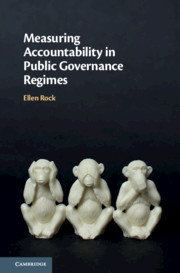'This is one of the best monographs on accountability that I have come across during my academic career. The central argument - we can only establish deficits or overloads by applying a variety of benchmarks - is very well argued and convincing. The book is an original and very relevant contribution to the existing literature and really takes the debate several steps further. The author has an exceptional familiarity with the relevant literature and is able to utilize a large variety of theoretical concepts and dimensions in order to get a better understanding of the very complex issues regarding accountability. She has an excellent capacity for independent thinking and is able to operate smoothly across a variety of disciplines, such as law, philosophy, and the social sciences. The manuscript is very well written, has a clear structure and is reader-friendly, the complexity of the issues notwithstanding, which is very rare in this line of work.'
M.A.P. Bovens - Professor at Utrecht University, Faculteit Recht, Economie, Bestuur en Organisatie
'In the accountability literature, claims of accountability 'deficits' and 'overloads' are ubiquitous. In this highly original book, Ellen Rock addresses the obvious, but rarely asked, question of how to measure accountability: how much accountability is too little, too much or just enough? Her systematic and rigorous analyses of what is meant by 'accountability' and how it might be measured shine a very bright light on dark and neglected corners of the theory and practice of public law and public administration. Her work greatly enhances our understanding of central challenges in controlling the exercise of public power.'
Peter Cane - Senior Research Fellow Christ’s College, University of Cambridge
'Dr Ellen Rock has taken ‘accountability’ - a term so ubiquitous in analyses of public governance that it has become almost clichéd - and exposed it to a forensic analysis that reveals both the content that it already possesses and the extent to which its meaning remains to be revealed. She resists the temptation to declare accountability to be ‘A Good Thing’ and reason accordingly from that assumption. Instead, her analysis is conducted on the basis that more light is still to be shed on the accountability concept and to that end she spends the central part of the book asking questions such as who should be accountable, to whom, for what and how. These are difficult questions which are picked apart with precision and appropriate dedication. For all her thoroughness, Rock does not presume that everything that there is to know on this topic will be known by a reader who reaches the end of the book. Rather, she is comfortable to lead the way through what is known about accountability and then to point to the research still to be undertaken. This is a book of true scholarship which contributes to, and leads discussion of, a very important concept without ever presuming to close that discussion from further analysis. This book is an essential text for those interested in review of public governance and I recommend it with genuine and whole-hearted enthusiasm.'
Greg Weeks - Associate Professor and Head of School (Acting), ANU Law School, Australian National University
‘This is a work of considerable scholarship. Dr Rock writes very clearly. Despite the significant theoretical component of the book, the information and arguments are easy to read and understand. The output is a book which has significantly advanced the understanding in Australia of the tools needed for measurement of accountability, a foundational objective for testing the suitability and appropriateness of the institutions comprising the Australian legal system. She is to be congratulated for tackling such an ambitious task and doing it so effectively.’
Robin Creyke
Source: Australian Journal of Administrative Law



